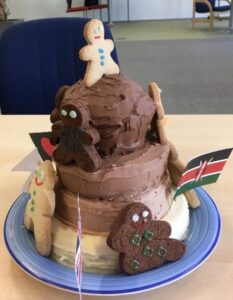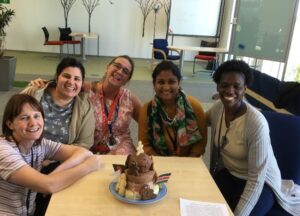In this post Jo Josephidou reflects on the under-explored link between academic research and making cakes- there’s more of a connection than you might think!!

Every year the Graduate School at The Open University hold a highly creative competition where postgraduate students have the opportunity to ‘bake’ their research in the form of a cake. You might be wondering what the point of such an activity is; is it just a bit of light relief from all that difficult postgraduate reading and writing? When we think about studying, at whatever level, we can focus on the reading and writing stuff and forget that the thinking stuff is perhaps the most important bit. The thinking stuff doesn’t have to be done at a desk or in a library, it can be done on a walk, in the swimming pool or indeed in the kitchen baking a cake!
An added bonus of thinking about your work in a different and more creative way can help you make links, see omissions or make observations you have not considered before. For example, sometimes academics will write a poem about their research, or they will try to draw it in a picture. I have found both these approaches really helpful – not to share with anyone but just to help me develop my own ideas. Professor Pat Thomson discusses the importance of creativity in research in her blog post ‘Research as Creative Practice’ that you might like to read. She notes how ‘unseen social relations are embedded in and frame everyday events, conversations, processes and relations’, everyday events such as baking a cake perhaps. Reflecting on our ongoing project ‘The Journey of the Early Childhood Student’, I thought about what it might look like in cake form – especially from someone who has no particular talents in the kitchen. We have shared previously on this blog that we have been considering the concept of ‘Mattering’ in this project and that made me think about what ingredients matter in a cake, and in what quantity. For example, if I am trying to make a healthier cake, does it matter if I reduce the amount of sugar or replace the butter with another ingredient. In the same way, what ‘ingredients’ are important for our students if we want them to feel that they matter.
At this point, you may be thinking, yes, I get it but I’m not sure what my cake would like in practice. Lucy took part in the competition when she was a postgraduate student, and she shares how she approached the competition with her fellow students to bake the cake above:
My fellow students and I were all doing research with children, so we made the ‘Bronfenbake’; this cake represents Bronfenbrenner’s ecological systems theory. This theory explains how a child’s development is influenced by a series of interconnected environmental systems, such as their family, communities and wider society. We were all studying different aspects of children’s lives in different cultural contexts, yet all our research highlighted that, to understand children’s lives and experiences, we also need to understand the contexts in which they live.

So what about you? Why don’t you have a go at ‘baking’ your next assignment – and don’t forget to share a photo with us!
